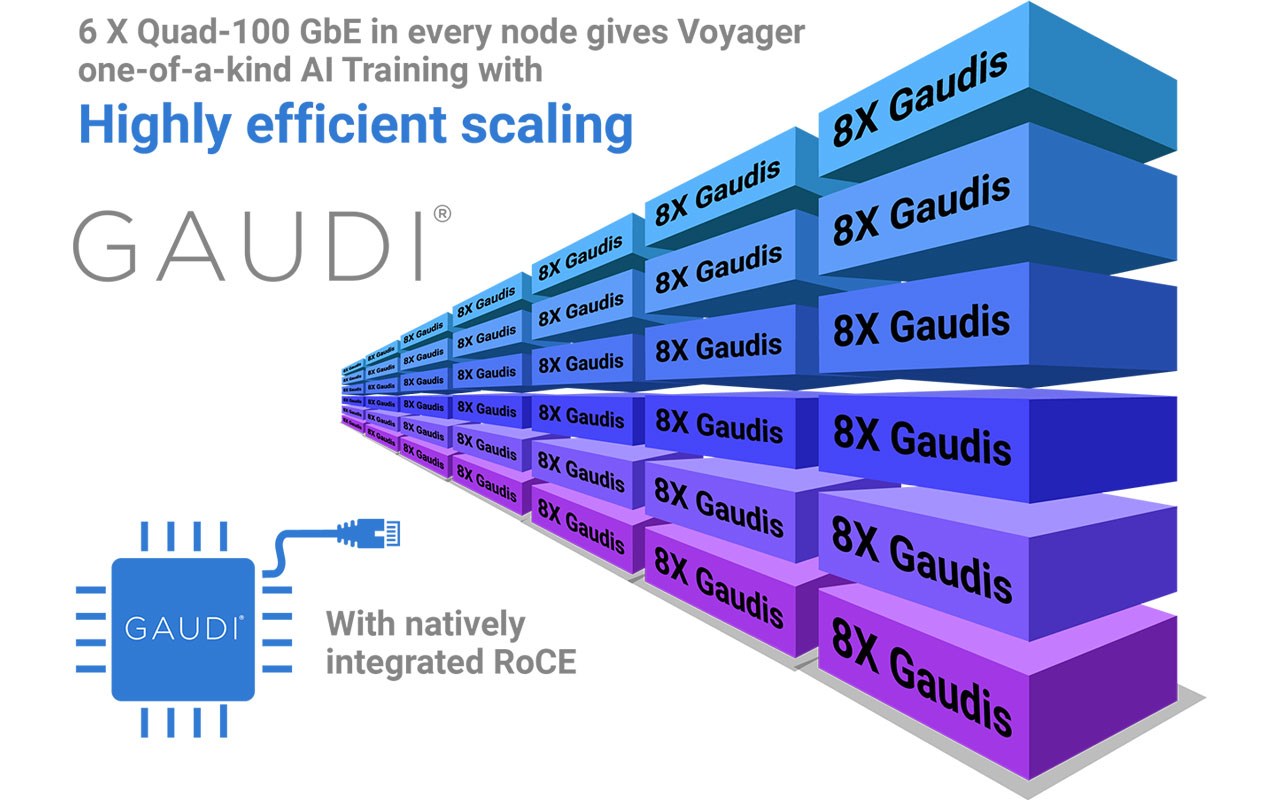San Diego Supercomputer Center Teams Up with Habana to Power Voyager
Experimental computer is designed for exploration of AI processors in science and engineering
Published Date
By:
- Cynthia Dillon
Share This:
Article Content
The San Diego Supercomputer Center (SDSC) at UC San Diego, a leader and pioneer in high-performance and data-intensive computing, has selected the Intel company’s Habana Labs artificial intelligence (AI) training and inference accelerators to provide high-performance, high-efficiency AI compute for its experimental Voyager supercomputer.
Scheduled to enter service in the fall of 2021, Voyager will be dedicated to advancing AI research across a range of science and engineering domains. The system build-out, as well as ongoing community support and operations, is funded by a 5-year, multimillion-dollar grant from the National Science Foundation (NSF), split between hardware acquisition and operations.
Voyager will be a first-of-its-kind experimental system in the NSF resource portfolio, complementing systems focused on capacity production computing, such as SDSC’s recently launched Expanse system.
As part of SDSC’s mission to support science and engineering, and in response to the NSF opportunity, SDSC required a cost effective, yet powerful system to accelerate the development of AI algorithms. SDSC chose the combination of Habana® AI processors and Intel® Xeon® Scalable CPUs in Supermicro servers. When complete, the Voyager system will contain over 42 Supermicro X12 Gaudi® AI Training Systems with 336 Habana Gaudi processors—designed for scaling large supercomputer training applications—and 16 Habana Goya processors to power AI inference models.

“We are honored that Habana’s AI processors have been selected to power the AI workloads that will run on San Diego Supercomputer Center’s Voyager supercomputer,” said Eitan Medina, chief business officer at Habana. “This implementation of our Gaudi and Goya products showcases how top academic institutions like SDSC can harness efficiency and performance to effectively address the growing demands of AI research workloads.”
Habana Gaudi AI training and Goya inference processors are architected to drive performance and efficiency in AI operations. They will provide data scientists and researchers having access to Voyager with flexibility to customize models with programmable Tensor Processor Cores and kernel libraries, and ease implementation with Habana’s SynapseAI® Software platform, which supports popular machine learning frameworks and AI models for applications such as vision, natural language processing and recommendation systems.
Amit Majumdar is the principal investigator (PI), with co-PIs that include SDSC’s Mai Nguyen and Robert Sinkovits, as well as Computational Chemist and Biophysicist Rommie Amaro, from the Department of Chemistry and Biochemistry, and Physicist Javier Duarte, from the Department of Physics in UC San Diego’s Division of Physical Sciences. SDSC’s Shawn Strande is the project manager.
“With innovative solutions optimized for deep learning operations and AI workloads, Habana accelerators are excellent choices to power Voyager’s forthcoming AI research,” said Majumdar, who also leads SDSC’s Data Enabled Scientific Computing Division. “We look forward to partnering with Habana, Intel and Supermicro to bring this uniquely efficient class of compute capabilities to the Voyager program, giving academic researchers access to one of the most capable and innovative AI-focused systems available today.”
Technology partner Supermicro, a global leader in enterprise computing, storage, networking solutions, and green computing technology, will provide the Habana-based AI systems to SDSC for Voyager. These include the Supermicro X12 Gaudi AI Training System, which includes the newly announced 3rd Gen Intel Xeon Scalable Processors and the Supermicro SuperServer 4029GP-T featuring eight Goya HL-100 PCIe cards for AI inference, paired with dual-socket Intel® Xeon® Scalable Processors.
“Combining Supermicro's advanced application-optimized server and storage hardware with Habana's AI training and inference products is an outstanding solution for SDSC's multi-year Voyager AI project,” said Ray Pang, vice president of technology and business enablement at Supermicro. “We continue to work closely with leading innovators to deliver solutions for computationally intensive projects worldwide at leading research and HPC environments for science and medical discovery, compute and leading-edge AI solutions.”
According to Vice President and General Manager of Intel’s High-Performance Computing group Trish Damkroger, the level of performance and efficiency that Voyager will require is precisely what Intel architectures are designed for. “Our Xeon Scalable processors coupled with Habana AI accelerators will ensure Voyager’s users have the HPC and AI capabilities they need to power their game-changing research,” she said.
About SDSC
The San Diego Supercomputer Center (SDSC) is a leader and pioneer in high-performance and data-intensive computing, providing cyberinfrastructure resources, services and expertise to the national research community, academia and industry. Located on the UC San Diego campus, SDSC supports hundreds of multidisciplinary programs spanning a wide variety of domains, from astrophysics and earth sciences to disease research and drug discovery. SDSC operates several high-performance computing systems and data resources on behalf of the national community.
About Habana
Habana Labs is a leading AI Processor company founded in 2016 to develop purpose-built processor platforms that are optimized for training deep neural networks and for inference deployment in production environments. We are unlocking the true potential of AI with platforms offering orders of magnitude improvements in processing performance, scalability, cost, and power consumption. Acquired by Intel, Inc. in 2019, Habana operates as an independent business unit in the Intel Data Products Group.
Share This:
You May Also Like
Stay in the Know
Keep up with all the latest from UC San Diego. Subscribe to the newsletter today.



